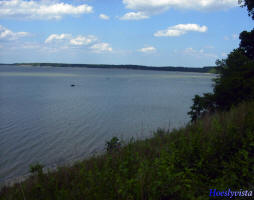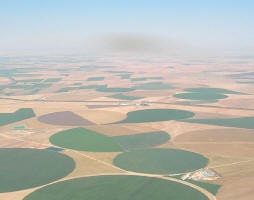 Climate change hits water-deprived Cyprus
Climate change hits water-deprived Cyprus
Located a few kilometres away from the southern coastal city of Limassol, Palamytha is among five villages where residents have been forced to live on bottled water since March after it was discovered that the underground water supply which it had been tapping into contained high salinity levels.
Dozens of towns and villages on the eastern Mediterranean island of Cyprus have been tapping the island's aquifer over the past few years, an underground layer of permeable water-bearing rock, to make up for the shortfall of water that has hit the island.
Nearby, the small pool of water currently lying at the bottom of Cyprus largest reservoir, Kouris, is expected to be used up by the end of summer as authorities face the dilemma of importing costly water from Greece and how much they should rely on energy-intensive desalination to beat the shortage.
Kouris, the main source for the pipeline serving the districts of the capital Nicosia and the southern regions of Limassol and Larnaca, is now less than one per cent full.
'The situation is very bad. We are at the mercy of the environment and if the drought continues for a fifth consecutive year, then the effects of the lack of rainfall will be extremely severe,' Kyriakos Kyrou, a senior engineer from the Cyprus Water Department told Deutsche Presse-Agentur dpa.
'Birds are disappearing and animals and flora are suffering,' says Kyrou, adding that the depletion of the island's aquifer is a very serious problem.
Although having one of the highest concentrations of reservoirs in Europe, officials say they are now nearly empty as they frantically try to meet a 16-million-cubic-metre water deficit.
Faced with a crisis on its hands, the government is currently trying to tackle the problem with household rationing and importing 8-million-cubic-metres of water in tanker ships from neighbouring Greece.
It is also trying to build two desalination plants which have been on the drawing board for years.
But despite the cuts, the tourism sector, the island's chief money-maker, remains largely untouched and many resentful Cypriots say the island's 14 golf courses should never have been built in the first place.
'The government has reduced the water flow to households so we only have water three times a week but other tourist places with golf courses are operating as if nothing has happened,' says Zoe Sotiriou, 25, a resident of the Cypriot capital Nicosia.
'Now we think twice about using water for such things as washing our cars or cleaning our front porch.'
The government says it is working to a long-term strategy to help the island deal with longer dry spells, including further water cuts for agriculture and replacing them with treated sewage water, constructing more desalination plants and increasing the production capacity in the two existing ones.
'We predict that 90 to 95 per cent of the total domestic water supply of Cyprus will be met by desalination plants in the next few years,' says Kyrou.
'Desalination is not the most ideal choice because it uses up a lot of energy and causes greenhouse gas, but we clearly have no other option.'
Charalampos Theopemptou, the Cypriot Commissioner for the Environment, insists the Mediterranean will be the worst affected by climate change because of the increase in temperatures and the decrease in rainfall.
'What we are seeing in Cyprus and the rest of the Mediterranean is extreme weather conditions and drought is one of them,' says Theopemptou.
'It is not just that we do not have enough rainfall to fill up our dams and rivers for irrigation but we are also seeing a 70-per-cent reduction in the replenishment of the aquifer and this has had a catastrophic affect on agriculture.'
When Cyprus achieved independence in 1960, the backbone of its economy was agriculture, but today only 2.8 per cent of the gross domestic product is achieved through the production of crops and animal farming.
'The government does not provide us with water to grow our crops so we are forced to pump our own water from the ground which is costly. The end result is that there are fewer farmers now than before,' says 55-year-old potato farmer Christos Miso.
Meteorologists say rainfall on Cyprus has fallen by 20 per cent in the last three decades while temperatures have risen.
According to Kyrou, while rainfall has dropped by 20 per cent, the inflow of rainfall into reservoirs has declined by 40 per cent, namely because of rising temperatures which has resulted in increased evaporation.
'We knew of the problems and we should have taken measures earlier but we were hoping that it would have rained,' said Kyrou.
| Contact information |
Christine Pirovolakis, Europe News
|
|---|---|
| News type | Inbrief |
| File link |
http://www.monstersandcritics.com/news/europe/news/article_1421096.php/Climate_change_hits_water-deprived_Cyprus__Feature_ |
| Source of information | Europe News |
| Keyword(s) | desalination, rainfall, farming |
| Subject(s) | AGRICULTURE , DRINKING WATER , DRINKING WATER AND SANITATION : COMMON PROCESSES OF PURIFICATION AND TREATMENT , ENERGY , HYDRAULICS - HYDROLOGY , INFRASTRUCTURES , NATURAL MEDIUM , POLICY-WATER POLICY AND WATER MANAGEMENT , PREVENTION AND NUISANCES POLLUTION , RISKS AND CLIMATOLOGY , SANITATION -STRICT PURIFICATION PROCESSES , WATER DEMAND |
| Relation | http://www.emwis.net/countries/fol135532/country993194 |
| Geographical coverage | Cyprus |
| News date | 19/08/2008 |
| Working language(s) | ENGLISH |
 you are not logged in
you are not logged in





